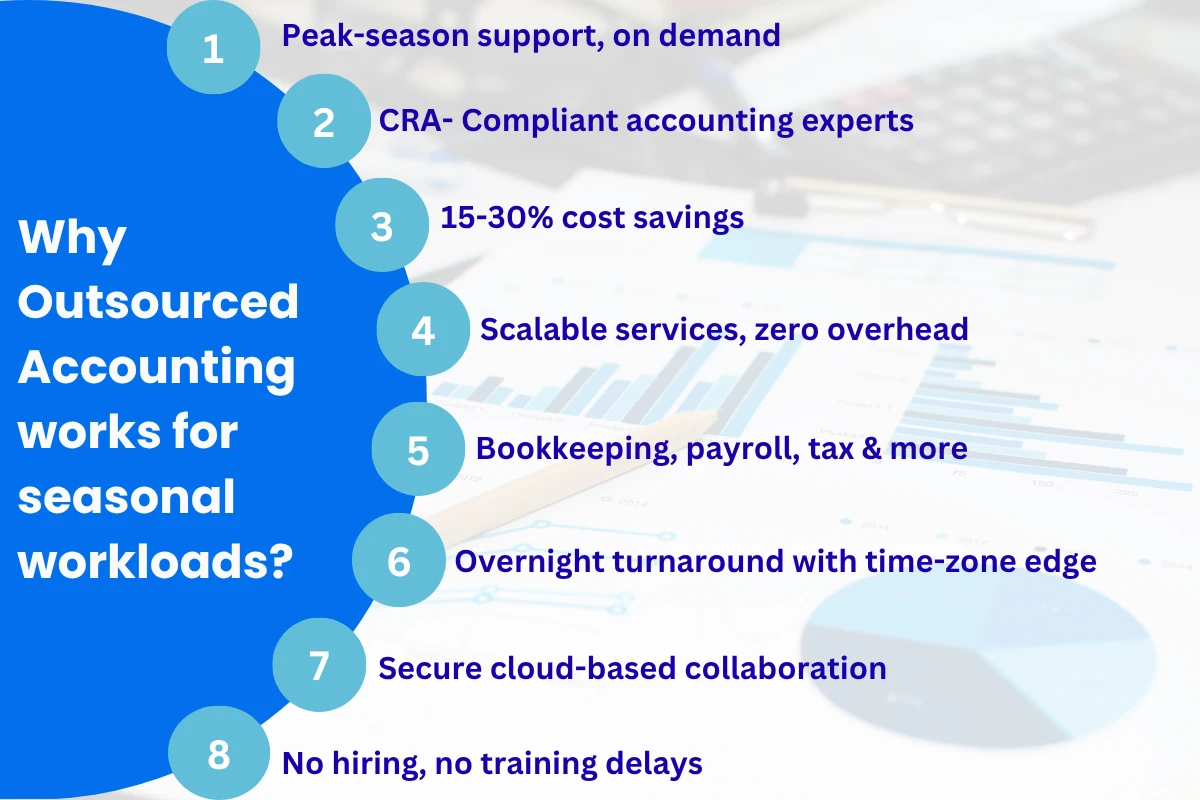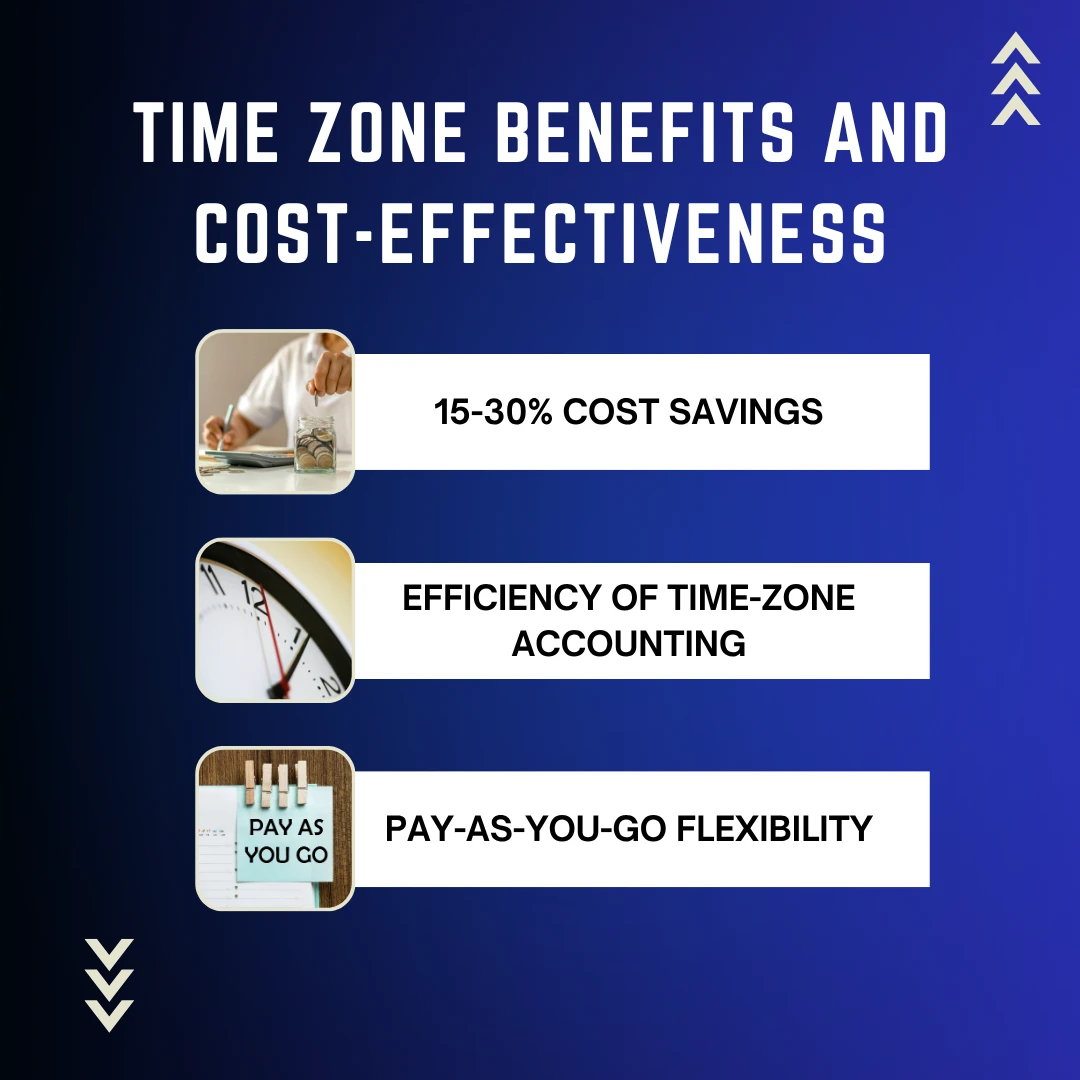
GET A FREE CONSULTATION TODAY!
Fill in the details, and our experts will contact you.
The Canadian financial reporting environment requires accuracy, promptness, and high-tech compliance with the CRA regulations, especially during periods of peak demand. Between January and April every year, most businesses in the country go into an intense phase because of the tax filing deadline, issuing of T4 slips, GST/HST returns and corporate year-end reporting. These times are overwhelming to many. Already overworked internal accounting departments struggle to stay on top of the growing reporting, reconciliation and regulatory demands.
Large enterprises are not the only ones who face this challenge. Small and medium-sized businesses, whether it is a retail stores in Ontario or a construction company in Alberta, are affected just as much, or even more. Recruiting temporary, in-house assistance to deal with seasonal peaks frequently results in uneven production, continuity problems and more administrative burden.
That is where the accounting outsourcing in Canada comes into the game to get seasonal accounting support as per your firm’s requirement. Outsourcing accounting and bookkeeping services allows companies to handle seasonal workload with greater flexibility, precision and less cost. Rather than hiring temporary workers or overworking the internal groups, outsourcing helps Canadian companies to get access to skilled professionals who are trained in IFRS, ASPE and local taxation rules and regulations and who can fill the gap at the exact time, when required.
Seasonal accounting outsourcing is no longer a matter of operational option, but a clever way of reacting to the cyclical nature of accounting workload within the Canadian regulatory framework.

Seasonal accounting workload is not an exception but an ongoing operational reality for most Canadian businesses. These peak seasons are characterized by regulatory deadlines, audit planning, and financial reporting periods which overlap within limited periods of time.
The following are the mainstream causes of seasonal accounting pressure in Canada:
This time demands that businesses:
Any slight delay may result in CRA penalties, interest, or audits. The burden is increased by the intricacy of maintaining compliance with regular changes in tax rules.
In Q4 or at the end of the fiscal year of an organization, teams need to:
They are also very demanding in terms of labour and expertise, which sometimes many in-house teams cannot commit to because of the continuous tasks at hand.
Periodic CRA audits apply to many businesses, particularly those that maintain tax credits, deductions or subsidies (such as SR&ED). Unprepared teams can be plunged into disarray by the sudden necessity to generate years' worth of clean records.
The outcomes may be severe without adequate support, including staff burnout and error rates, along with the failure to meet CRA deadlines and non-compliance fines. The solution to long-term financial management lies in identifying such challenges at the beginning and developing proactive solutions to them.
In situations when Canadian small businesses are in need of seasonal financial relief, particularly in the periods of tax season, the end of a fiscal year, or an audit, the outsourced accounting firms can be a quick, strategic solution. Outsourced tax professionals can also fill in the gap with speed, knowledge, and accuracy, unlike the in-house teams, which might be overwhelmed with the daily business activities.
Instead of spending time and resources on the recruitment process, businesses can have instant access to the accountants who are already knowledgeable in Canadian GAAP, ASPE, IFRS, and CRA rules and regulations. These are the individuals who are equipped to deal with a great degree of assignments that are quite complicated- T2 filings, GST/HST returns, payroll reconciliations, and year-end financial statements.
Recruiting seasonal employees to work temporarily may require weeks, and that is in addition to the time that will be spent processing and training them. Accounting outsourcing in Canada does away with this delay. Companies have access to a ready source of professionals without the costs of contracts, benefits, or even internal human resources procedures.
Outsourced accounting firms provides scaling accounting solutions, where businesses can reduce or increase support, according to seasonal requirements. Do you require additional manpower for two weeks in tax season or three months of Q4 reporting? Outsourcing meets your workflow needs, with no long-term contract necessary.
Most outsourced accounting firms provide a wide array of services which can sustain a seasonal requirement, such as:
To businesses operating on thin margins during peak periods, outsourcing is not a quick fix solution, but a wise idea to remain precise, compliant and on time.
With the current digital-first business landscape, cloud-based accounting services have disrupted how Canadian businesses cooperate with outsourced teams. Outsourcing does not have to imply the loss of visibility or control anymore; modern outsourcing implies the gain of efficiency and transparency due to the secure platforms and integrated systems.
The most outsourced companies in Canada use reliable accounting software, such as QuickBooks Online, Xero, Sage, and Wave, which are all consistent with Canadian tax and financial reporting requirements. These tools can connect easily with your internal systems, bank feeds to reduce manual entries and errors.
Business outsourcing bookkeeping in Canada does not have to lose control when it comes through secure portals and cloud access. Managers are able to check progress, order reports or load documents at any time or place. There are also collaboration tools that make it possible to have shared dashboards, comment logs, and task assignments to get accountability.
Data security and privacy are taken seriously by outsourced accounting providers, particularly regarding Canada PIPEDA (Personal Information Protection and Electronic Documents Act). Data is saved on encrypted Canadian-based cloud drives, and user authentication is set on multiple levels and backed up.
This virtual accounting solution not only facilitates the ease of seasonal transactions but also fosters confidence. Companies can be sure that their financial information is secure and in accordance with national legislation when they shift the workload.
This is one of the most convincing arguments why Canadian businesses resort to outsourcing services in terms of peak accounting periods, which hold a lot of cost advantage as well as time advantage. Rather than employing local temporary workers or paying overtime to in-house teams, engaging offshore accounting providers, especially those located in such countries as India, can help cut down the costs and achieve higher productivity.

Outsourcing partners have been providing affordable accounting services that help companies save up to 30% in comparison to the temporary, domestic talent acquisition or internal team overburdening. There are no payments to make concerning the benefits, training, office space and recruitment costs, thus you pay only for the work done.
The difference between Canada and India in terms of time zone proves strategic during peak seasons. Assignments given to you at the close of your business day are done by the morning, so that work can progress overnight and have a quicker turnaround time on a tax prep, reconciliation or reporting assignment. Project schedules are significantly reduced by this 24-hour workflow.
In most outsourcing contracts, there is a provision for scalable engagement models wherein a business only has to pay on a per-use basis. You can get two weeks of bookkeeping or a quarter of full-cycle accounting with no overhead, no long-term commitment and no idle staffing expense.
Outsourcing provides a high degree of offshore skill coupled with a time-zone advantage at an unbeatable price, and as such, it would be a wise decision on the part of Canadian companies to contend with the seasonal increase in workload.
The idea of outsourcing accounting solutions is a game-changer, and to make it work, one should carefully select a partner to reach successful results. Canadian business firms ought to observe some salient factors before engaging an outsourced company so that their working relationship is not marred by litigation issues.'
The outsourced team should be knowledgeable of the Canadian accounting standards, like IFRS, ASPE, and CRA compliance requirements. Inquire about the training of the team in regard to the preparation of T2 returns, GST/HST returns and payroll summaries that meet Canadian deadlines and formats. Failure to understand local taxes can prove to be a very expensive mistake.
Financial information is sensitive information, so select a partner that operates on secure accounting system with bank-level encryption, multi-factor authentication, and PIPEDA-compliant cloud platforms. Also confirm that data is stored on servers located in Canada, or visibility over data location and back-ups.
Successful outsourcing is grounded on proper and opportune communication. Ask about:
Also, evaluate the workflow management in the company: Do they have project management software? Is there a point of single contact?
Discuss and settle on the scope of work, time frames, deliverables and pricing before commencing. Establishing service-level agreements (SLAs) will keep both parties accountable and clear. This also assists you in gauging performance throughout the engagement.
The appropriate accounting staffing solution is more than a price, it is about CRA-compliant accounting, safe systems and professional delivery, which understands your business objectives.
For Canadian businesses, seasonal accounting support, be it tax season, audit cycle or year-end close, can put a lot of pressure on the internal resources. Dealing with short deadlines, being CRA-compliant and not making expensive mistakes needs more than additional effort; it needs a plan. This is why an increasing number of organizations are considering outsourced accounting not only as a way to decrease spending, but as a means of ensuring accuracy, efficiency and peace of mind during their peak periods.
In the process of matching the expert support, the business is in a better position to concentrate on the essential functions, as the financial operations are being taken care of with accuracy and trustworthiness. With outsourcing, you get scale, quicker turnaround, and compliance risk buffer with none of the overhead of recruiting and training temporary employees.
Whether you need reliable, scalable seasonal accounting services in Canada, look no further. Aone Outsourcing Canada can assist you with everything you want. Our services are tailored to your needs, whatever your workload and deadline may be, whether preparing for tax season, reconciling payroll or getting ready for an audit. Experienced people and safe cloud procedures enable us to ease your burden when it counts the most.
see how seasonal accounting can be so easy
Contact Us Email Us Call Us
At Aone Outsourcing Solutions, we believe smart businesses don’t just manage their accounting; they streamline their accounting process. With years of experience supporting accounting firms and businesses across the UK, USA, Canada, Australia, and Ireland, our team knows how to turn everyday financial processes into strategic advantages.
From bookkeeping and payroll to tax preparation, accounts payable, and compliance, weve helped firms simplify their accounting workflows, cut operational costs, and maintain complete accuracy at every step.
Because at Aone, your accounting success is the goal we care about most.
Content on this website is shared for general awareness and educational purposes only. It should not be taken as financial, accounting, taxation, or legal advice. At Aone Outsourcing Solutions, we do our best to keep all information relevant and accurate; however, we can’t promise that every detail is up to date or fits every business situation. Because regulations and compliance requirements can change, we encourage you to seek guidance from an expert professional before acting on any information on this site. Aone Outsourcing Solutions will not be responsible for any decisions made or losses incurred based on the material published on this website. For advice specific to your business needs, please get in touch with our team .